 |
| Marching Toward Progress |
| This past month, we celebrated Developmental Disabilities Awareness Month! Developmental Disabilities Month, observed each March, is dedicated to raising awareness about the experiences, rights, and contributions of individuals with developmental disabilities. This observance shines a spotlight on the barriers these individuals often face and emphasizes the importance of fairness and accessibility in all areas of life. It’s a time to celebrate the achievements of those with developmental disabilities, advocate for policies that support their full participation in society, and foster understanding within our communities. Developmental Disabilities Awareness Month has been making an impact for nearly four decades! ADAP, as a Protection and Advocacy Agency (P&A), plays a critical role in upholding the rights of people with developmental disabilities! Our mission is to ensure that individuals with disabilities have access to education, employment, healthcare, and community living opportunities. We provide legal advocacy, represent individuals facing discrimination, and investigate cases of abuse or neglect. We also educate people about their rights, empower them to self-advocate, and influence public policies to promote accessibility. ADAP, and other P&As like it, are essential in protecting the dignity and ensuring the full participation of people with developmental disabilities in society. In this edition of our new quarterly newsletter, you’ll read about all the amazing work going on around Alabama that ADAP has been involved with. You’ll get to see great photos of some powerful and empowering advocates that headed to the Alabama State House for Disability Advocacy Day, and we’ll keep you updated on what’s been happening in these past months’ legislative sessions. Just a quick reminder of our new newsletter format: – ADAP in the Community – Community Resources & Training Opportunities – Advisory Council Corner – Frequently Asked Questions (FAQ) – Policy & Advocacy Updates – In the News |
 |
| What’s ADAP been up to lately? |
| Disability Advocacy Day and the Jeff Ridgeway Award (2025) The day of advocacy at the State House was a powerful and inspiring experience, as people with disabilities, their families, supporters, and advocates came together to meet with lawmakers and share their stories. The day highlighted the importance of policies that address the challenges faced by the disability community, while also celebrating the strength and resilience of individuals advocating for their rights. The event underscored the critical role of self-advocacy, where people with disabilities took the lead in expressing our fundamental rights, emphasizing our ability to create meaningful change. Empowerment was at the heart of the day, reminding us that every person, regardless of ability, deserves a seat at the table and a voice in shaping a fairer and more accessible society. |
| The Jeff Ridgeway Award (2025) Described as a Bulldog who would not quit, an example of what a person can do if they work hard and keep working hard, Jeff Ridgeway was a person who never wavered in the pursuit of justice and equality for all Alabama citizens. Last month was the tenth anniversary of his death. In his way too short a life, he had an extraordinary impact on the self-advocacy movement in Alabama. ADAP is so pleased that in Jeff’s name, we once again honor two great Alabamians who carry on Jeff’s tradition of advocacy and are making a great impact on the lives of so many others. Jeff Ridgeway Awardees Brinda Dungan Brinda’s Nominee writes: A self-disclosed Traumatic Brain Injury Survivor and Advocate, Brinda has used her personal experiences, education, and her own vision to promote access to services and self-advocacy efforts for individuals with disabilities. Her vision has included using her strengths in communication and memory, to reach, record & gain access to resources all over the state to ensure individuals in need have access to these services to promote independence at home, community, and work for as long as possible. Her vision to find resources or create them, big or small- to make someone’s life easier daily and then using her talents to teach and advocate for the TBI community is unmatched. Brinda is passionate about her vision in her volunteer and employment opportunities, and continues to expand her self-advocacy work in both areas. In her current role with the Alabama Department of Rehabilitation Services, Brinda works for the Administration for Community Living Federal Grant and assists the State TBI Program with building a statewide TBI Navigation System. As one of the first AL statewide Navigators, Brinda connects individuals with TBI, their caregivers, and professionals to services all over the State of Alabama to ensure access for all. She brings together and educates these individuals/families on free resources/rights to promote their own informed decisions and take control of their own TBI care. She communicates with survivors about resources directly from hospital to home and those who call the State TBI Helpline. Brinda’s calm and always positive attitude despite her own obstacles provides a ray of hope for individuals who she works with daily. She self-advocates with her own coworkers and speaks up for her-self with professionals, as well as articulating her own needs and encouraging others to do. Brinda empowers individuals with TBI each quarter, assisting them with mapping out their own journeys and using the state TBI Newsletter to provide a platform for self-advocacy within the TBI community. Brinda’s self-advocacy work has expanded over 20 years within volunteer and employment opportunities. She had dedicated her career to working with others who are under-served. You can see this in her work with Brain Injury Alliance of Colorado as a case manager in seeking services and financial support for individuals with brain injury. She was also Colorado’s statewide Agency Liaison for the Coordinated Entry program for the homeless while gaining her certification as a Brain Injury Specialist and Supported Employment Professional. Brinda went even further to become an independent life skills trainer/facilitator to assist others with articulating their independent living needs. Brinda also found and directed her own nonprofit (Your Brain on Dirt) in 2016 to promote horticultural therapies for individuals with neurological disorders. In her spare time, Brinda promoted self-advocacy by volunteering as a member of the Hard to Serve Board, the Special Olympics, RSVP TBI/SCI Clinic, and an Accessible Soccer Team in Colorado. Since her move back to Alabama in 2021, Brinda has volunteered her time on the Alabama Head Injury Task Force and Advisory Board, as well as the UAB Spain TBI Model Systems Advisory Board and RSVP Clinics of Georgia in hopes of bringing services to Alabama. She naturally steps up to the plate to serve others before self. Brinda began her career in the special education, supported employment and the independent living arena supporting the disability community as a whole. While her knowledge spans into cross-disability efforts such as individuals with communication disorders, neurological disorders, acquired brain injuries, spinal cord injuries, diabetes, and cognitive disorders – her knowledge of resources and education in the disability community is incredibly expansive, I would dare say that its unmeasurable. For fun, Brinda researches the latest accessible techniques, assistive technology, recreational activities, travel, cooking, and out of state programs in efforts to assist more individuals with disabilities. Brinda continues to connect people all over the United States that she has met along her journey, while empowering individuals with disabilities that she has never met. Her knowledge of social support systems has assisted thousands of individuals in Colorado and Alabama. The Alabama TBI Program is fortunate to have her fighting for our cause daily! Colby Spangler Colby’s nominee writes: Colby exemplifies what it means to be a self-advocate! I have known Colby since he was a senior in high school. I have watched him go to college, live independently, and work at a job he loves. He has become an independent young man who helps advocate for people with disabilities. The Colby Act was passed due to his hard work and perseverance. The Colby Act allows supportive decision-making for people with disabilities. Colby won the Self Advocate of Distinction Award at last year’s Alabama Disability Conference and the PPLS’s First Freedom of Choice Award for his efforts to pass The Colby Act. Colby served on the PADD Council for ADAP for 2 years, he volunteered frequently with People First before that. He was one of the Huemann-Armstrong award recipients during 2020 for his efforts toward fighting ableism in education, bringing awareness to local schools on IPSE and college opportunities for students with IDDs. Colby helped start an inclusive club at the University of Alabama to further the efforts toward belonging called JOURNEY. He hosts small groups at his home that combine adults with and without disabilities who want to share experiences on their spiritual journeys. He is also on the UCEDD Council for self-advocates to help advise toward their efforts in research and development projects for ppl w disabilities. (In addition to his work at Publix, grassroots advocacy efforts with DISABLED SOUTH & Alabama Care). Colby is an amazing young man who helps others and demonstrates how to be a productive member of society. His work ethic and personality shine through all aspects of life. He embraces his disability by helping other people. Colby is deserving the Jeff Ridgeway Advocacy Award. Very heartfelt congratulations to the two incredible, inspiring, and POWERFUL Jeff Ridgeway Award 2025 winners! Mr. Ridgeway would be honored by your work to empower our community, and we are fortunate to have you fighting with all of us! |
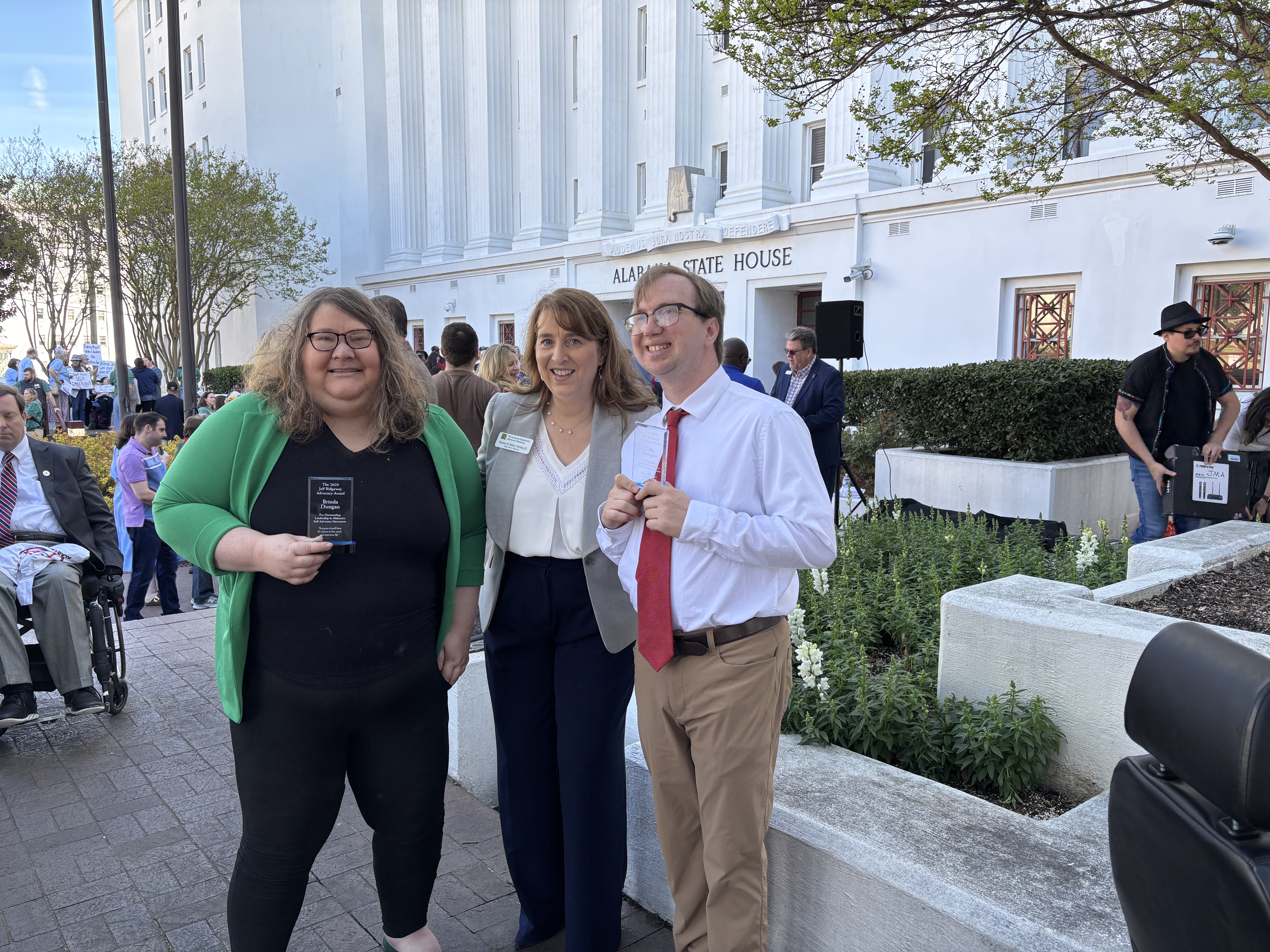 |
| From left: Jeff Ridgeway Award 2025 Winner Brinda Dungan, Executive Director of ADAP Shannon Shelley-Tremblay, and Jeff Ridgeway Award 2025 Winner Colby Spangler. |
| The Selma Jubilee ADAP went to Selma this month to celebrate the 60th Anniversary Selma Jubilee! The Selma Jubilee, officially known as the Bridge Crossing Jubilee, is an annual event held in Selma, Alabama, to commemorate the historic Selma-to-Montgomery marches of 1965, which were pivotal in the fight for voting rights in the United States. The Jubilee honors the courage and sacrifices of civil rights activists, particularly the events of “Bloody Sunday,” when peaceful marchers were brutally attacked while crossing the Edmund Pettus Bridge. The multi-day celebration includes educational panels, cultural events, and a symbolic march across the bridge, serving as both a remembrance of past struggles and a call to action for continued advocacy for justice and equality. It is a powerful reminder of the ongoing fight for civil rights and the importance of protecting democracy. In coalition with our partners at the American Association for People with Disabilities and REV UP!, as well as the League of Women Voters of Alabama and New Disabled South, we set up a table at the Jubilee Street Festival and met with attendees from all over the world. Our Senior Voting Rights Advocate, Nicky Watkins, also had the privilege of participating in a workshop on the barriers people with disabilities face in our state. |

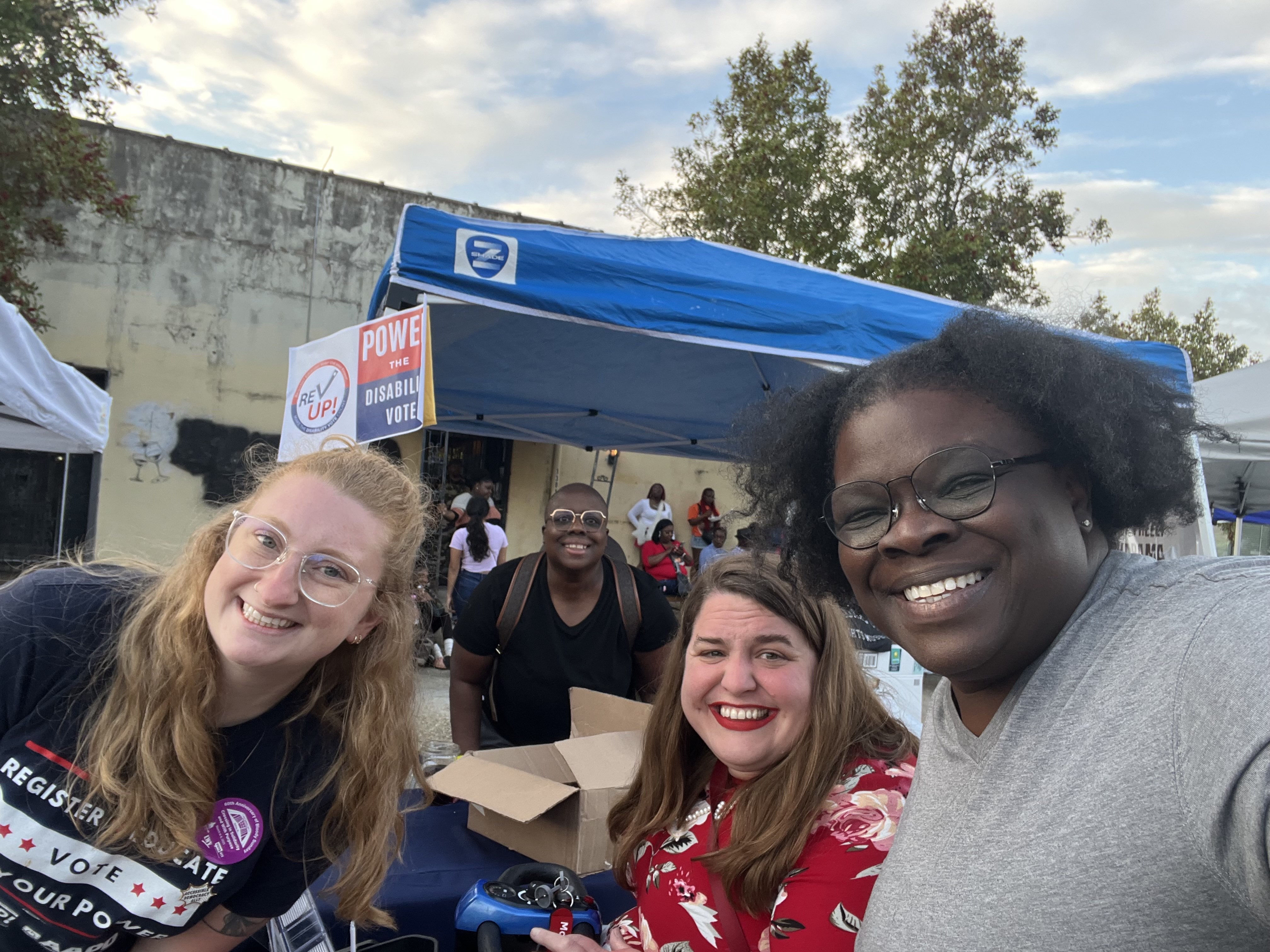
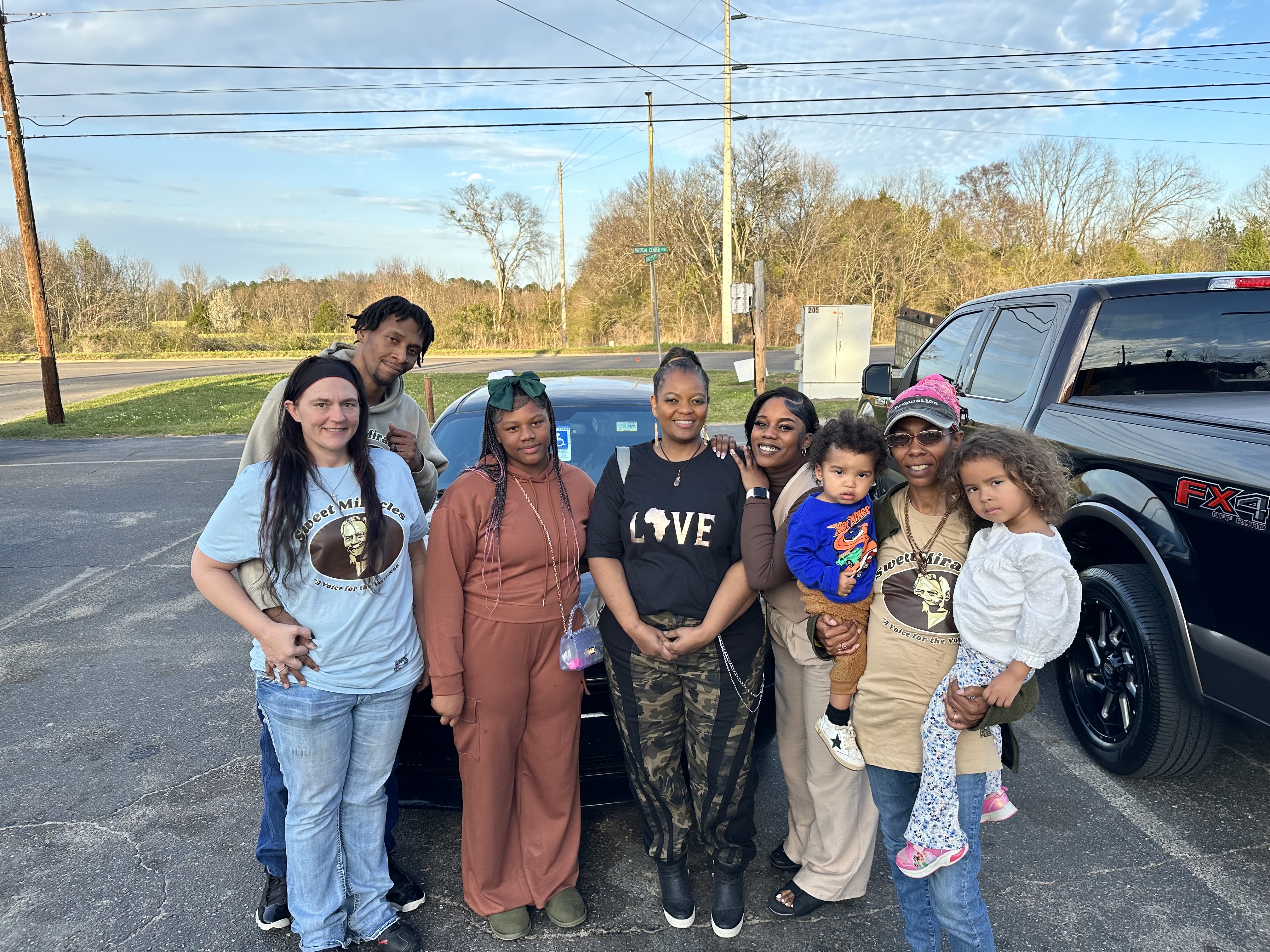
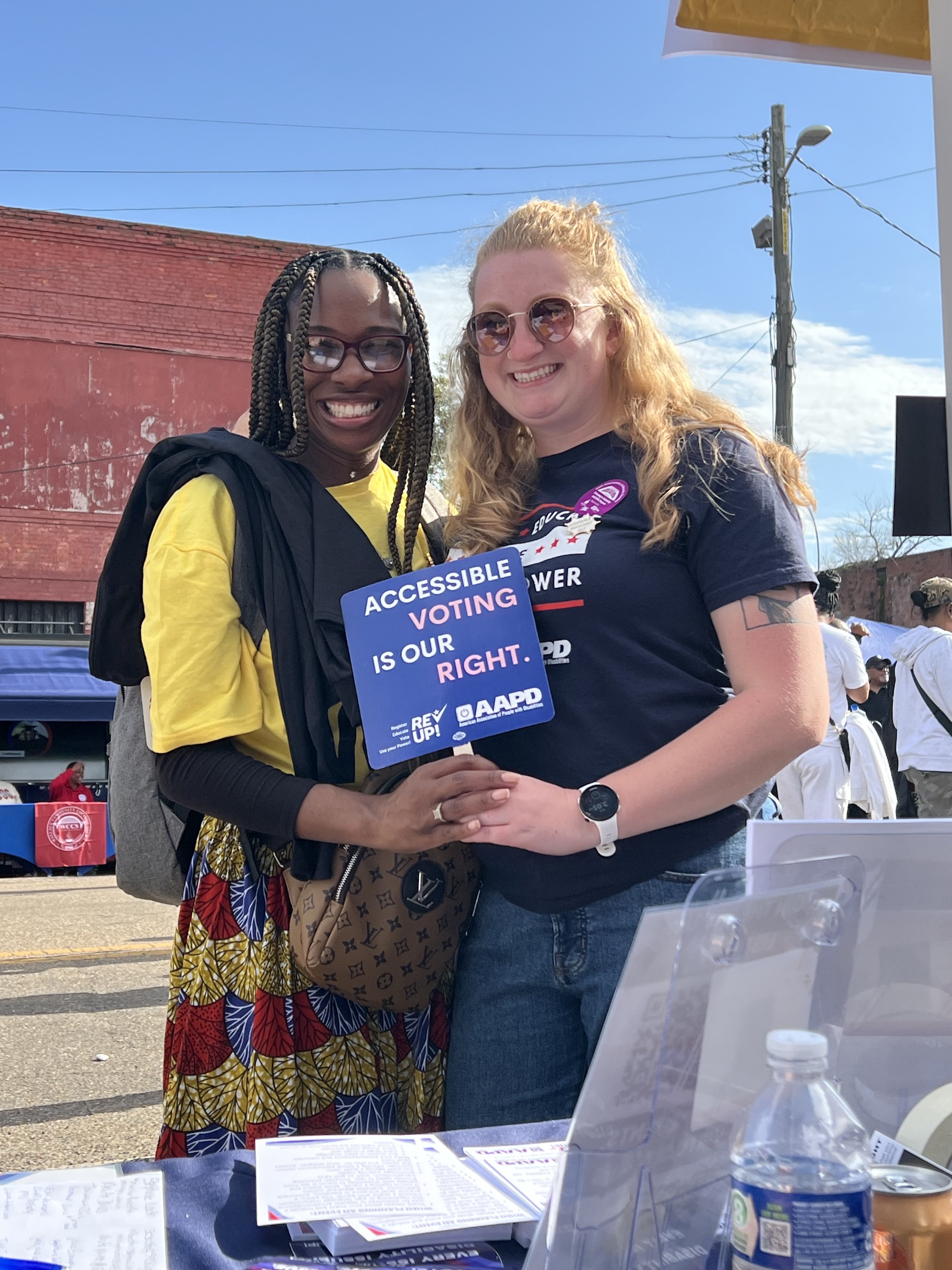
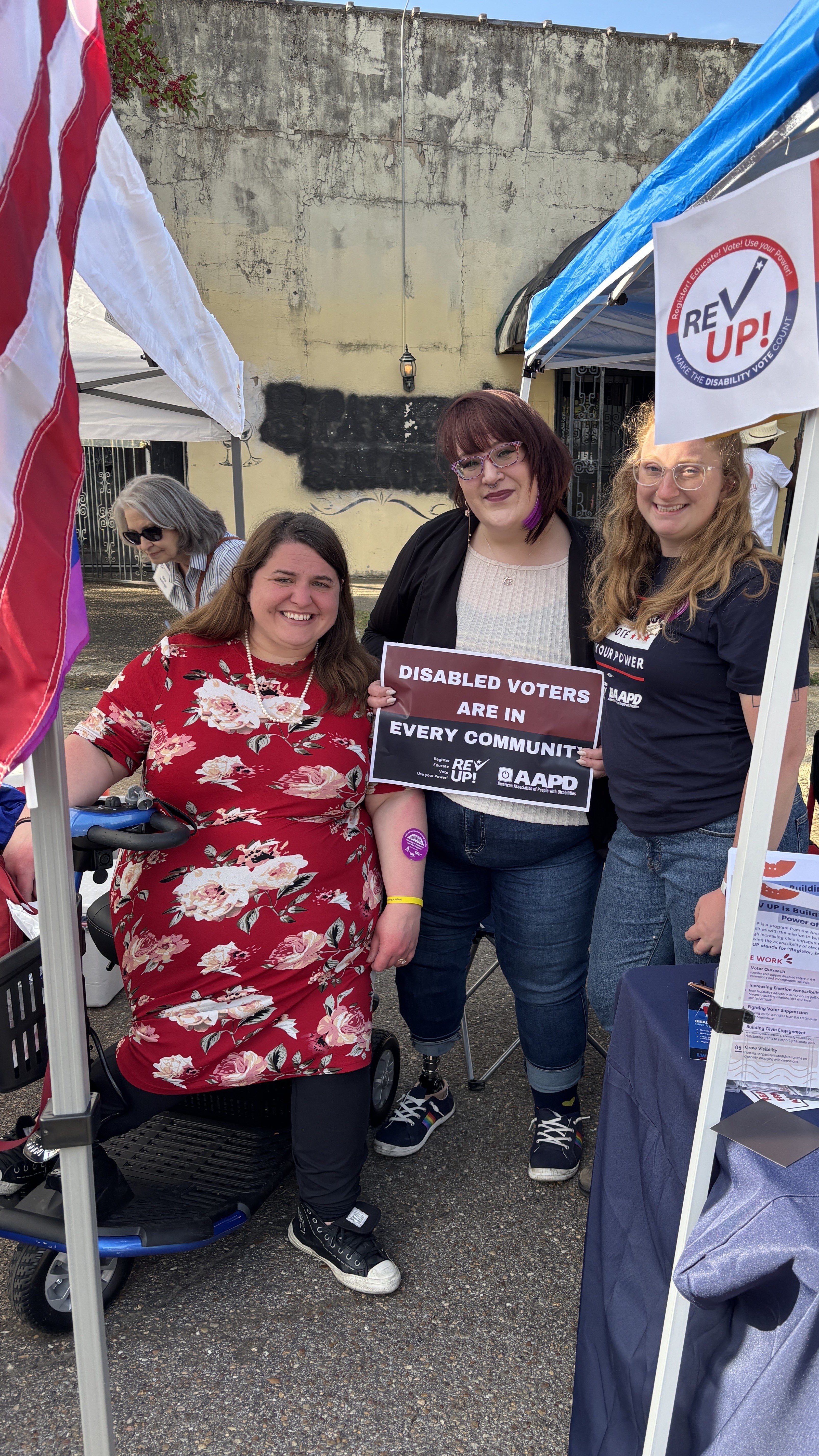
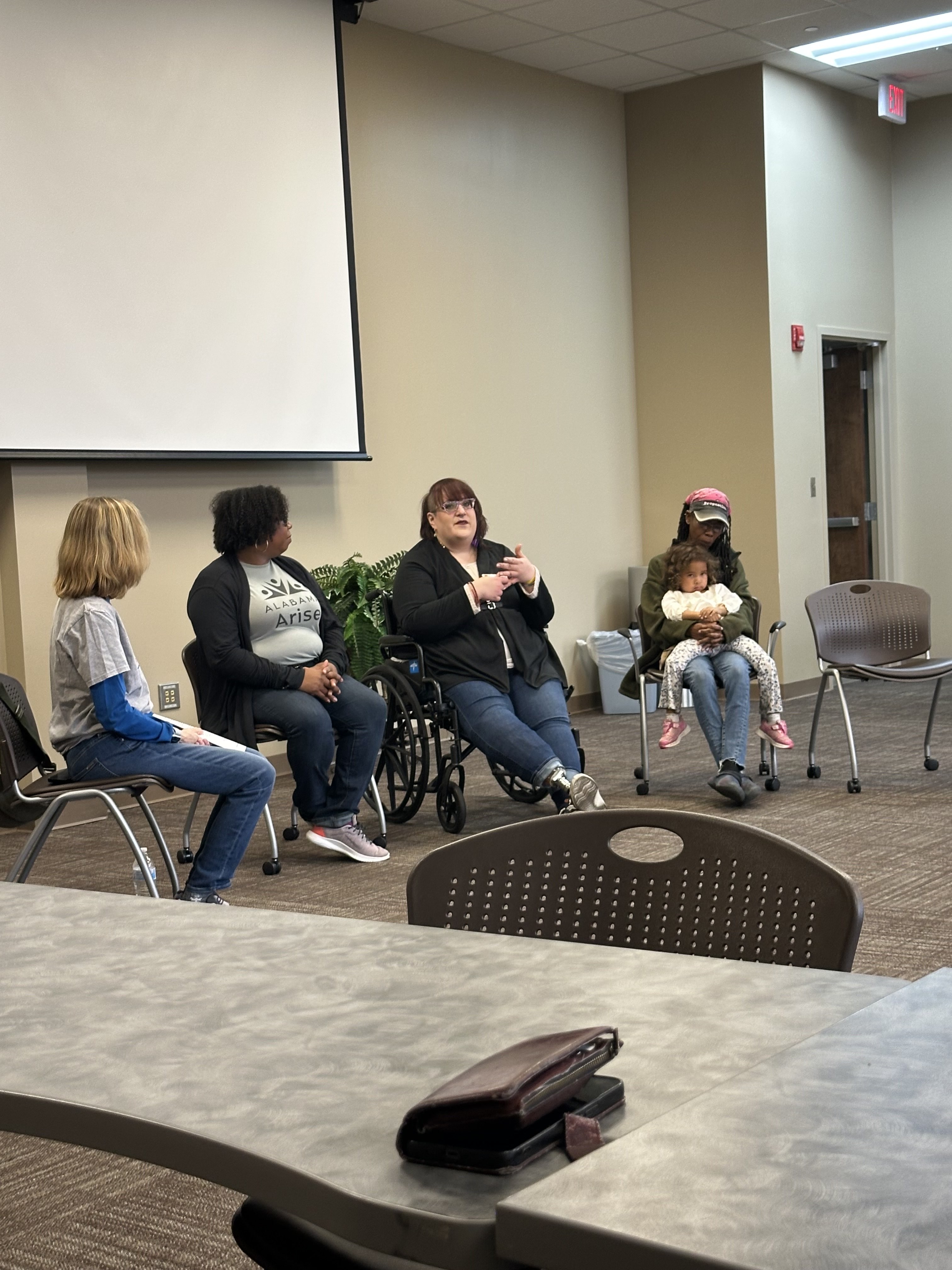
| Some photos from the Jubilee celebration, together with our coalition partners from the American Association for People with Disabilities (AAPD) and the voting rights coalition REV UP and New Disabled South, as well as community advocates, and Jubilee attendees. Pictured: Top Middle (from left): Alexia Kemerling, AAPD, Maria Town, CEO of AAPD, Shun Tucker-Allen of New Disabled South, and in the back, Shun’s wife, Yolanda. Top left (center): Karen Jones, organizer extraordinaire and member of the REV UP voting rights coalition. Bottom middle (from left): Maria Town, CEO of AAPD, Nicole Watkins, Senior Voting Rights Advocate & Outreach Coordinator of ADAP, and Alexia Kemerling, REV UP Coordinator and AAPD. |
| A Rave Review ADAP’s own Andrea Mixon got a rave review from a client this month! She provided information about employment supports available under the Intellectual Disabilities Waiver and from Vocational Rehabilitation (VR). ADAP will always prioritize providing good and actionable information to our community! If you’d like to learn more about the services ADAP provides in relation to vocational rehab, you should check out the Client Assistance Program! The Client Assistance Program (CAP) is a federally funded program that provides information, advice, and advocacy to people with disabilities who are applying for or receiving services provided by the Alabama Department of Rehabilitation Services (ADRS), the state’s Independent Living Centers (ILCs), and other programs funded by the Rehabilitation Act of 1973. Click the button below for more info! |
 |
| Upcoming Events & Opportunities |
| National Lifespan and Respite Conference The ARCH National Respite Network and Resource Center, in collaboration with the Alabama Lifespan Respite Network, will host the 2025 National Lifespan Respite Conference in Huntsville, AL, on April 1-3, 2025. The conference will be preceded by the Lifespan Respite Grantee and Partner Learning Symposium (by invitation only) on April 1, 2025. The theme for the conference, RAISE and Engage – Launch Respite Now, is not only a nod to the incredible history of the space industry in Huntsville, AL, also known as Rocket City USA, but also is a call to action. In 2022, the National Strategy to Support Family Caregiverswas released by the Administration for Community Living. The National Strategy was developed jointly by the RAISE Family Caregiving Advisory Council and the Advisory Council to Support Grandparents Raising Grandchildren, with extensive input from the public, including family caregivers and the people they support. The report includes nearly 500 actions that can be adopted at every level of government and across the public and private sectors, including actions that each of us can take, to advance supports to strengthen the nation’s more than 53 million family caregivers. League of Women Voters: Voter Skills Training In April, the League of Women Voters of Alabama will host their Voter Skills Training (virtual) with ADAP Executive Director Shannon Shelley-Tremblay and ADAP’s Senior Voting Rights Advocate Nicole Watkins. Stay updated on the event time and Zoom info with the LWVAL Facebook page! Alabama Disability ExpoThe River Region Disability Expo: connecting those living with a disability and their caretakers, with around 100 resources to help! This event is free and open to all, and you’ll see ADAP there! Date: Tuesday, April 22 Time: 10:00am – 3:00pm Where: Alcazar Shriner Temple, 555 Eastern Blvd., Montgomery, AL Full Life Ahead Camp Date: Begins Friday, May 16, 2025 Time: 5/16 8:00am – 5/18 2:00pm For more details, check out the Full Life Ahead Foundation’s Facebook page! Governor’s Office on Disability Consumer Advisory Council Meetings: Upcoming Spring 2025: Huntsville, Decatur, and Muscle Shoals: April 1 Birmingham, Anniston, and Gadsden: April 14 Montgomery and Tuscaloosa: April 17 Mobile and Dothan: April 29 All meetings will meet from 1:30pm-3:00pm via Zoom. If you’d like to attend, reach out to Jennifer Blakely at jennifer.blakely@good.alabama.gov for more info and the Zoom link. Community Catalyst Alabama Arise partner, Community Catalyst, is conducting a survey to better understand parent and caregiver perceptions of childhood vaccinations. Responses will help identify areas where more support or information may be needed about childhood vaccination. The survey, available in both English and Spanish, will be open until Monday, March 31. For more information on the research or to ask questions, please contact VEAP@communitycatalyst.org or call 617.338.6035. Participants must be 18 years or older and be a parent or caregiver of a child 18 years or younger. To take the survey, click here. |
 |
| Advisory Council and Partners in Policymaking |
| PADD ADAP’s Protection & Advocacy for Individuals with Developmental Disabilities (PADD) program provides legal advocacy services to protect and promote the civil rights of Alabamians with developmental disabilities (DD). ADAP’s PADD Advisory Council informs ADAP regarding the needs of these individuals and provides oversight and feedback to us regarding our PADD program priorities. The PADD Advisory Council consists of community members, the majority of whom are self-advocates with DD or their immediate family members. The Council meets at least three times a year in various locations across the state. Members are reimbursed for travel expenses to all meetings. PAIMI ADAP’s Protection & Advocacy for Individuals with Mental Illness (PAIMI) program provides legal advocacy services to protect and promote the civil rights of Alabamians with mental illness. ADAP’s PAIMI Advisory Council informs ADAP regarding the needs of these individuals and provides oversight and feedback to us regarding our PAIMI program priorities. The PAIMI Advisory Council consists of community members, the majority of whom are self-advocates with mental illness or their immediate family members. The Council meets at least three times a year in various locations across the state. Members are reimbursed for travel expenses to all meetings. For more information regarding the PADD and PAIMI Councils or to request help with completing an application, contact Executive Director Shannon Shelley-Tremblay by email or by phone at 205-348-4928. Upcoming Partners in Policymaking Happenings Partners in Policymaking Alabama (PIPA) is a free leadership training program for individuals with developmental disabilities (DD) and their family members. PIPA is a leadership training program designed for individuals with developmental disabilities (DD) and their family members. PIPA believes that the most significant and lasting public policy decisions come from the efforts of those most affected by them. In PIPA, participants develop the knowledge and skills needed to advocate for opportunities and supports that promote self-determination, independence, and integration in all aspects of community life for themselves and others. PIPA graduates are prepared to work with policymakers and empowered to be advocates for change. These advocacy skills are enhanced as graduates continue to work and grow together as the Partners Alumni Network (PAN), where they may also serve as mentors for future PIPA participants. PIPA will meet next on Friday, May 16, at the Hilton Birmingham Downtown at UAB. |
 |
| This month’s FAQ is all about developmental disabilities! (Or DD for short!) Q: What are developmental disabilities? A: Developmental disabilities are a group of conditions that begin during the developmental period, often before the age of 22, and cause physical, cognitive, behavioral, or learning challenges that may persist throughout a person’s life. Q: What are some common types of developmental disabilities? A: Common types include autism spectrum disorder (ASD), cerebral palsy, Down syndrome, intellectual disabilities, attention-deficit/hyperactivity disorder (ADHD), and learning disabilities. Q: What causes developmental disabilities? A: Developmental disabilities can have various causes, including genetic factors, prenatal issues, infections during pregnancy, premature birth, or environmental exposures such as lead or alcohol. Q: Are developmental disabilities genetic or environmental? A: They can be caused by genetic factors (e.g., inherited conditions like Down syndrome) or environmental influences (e.g., prenatal exposure to harmful substances), and sometimes a combination of both. Q: What kinds of barriers do people with DD face when it comes to advocacy? A: Historically, societal stigma and misconceptions have often pushed people with developmental disabilities out of the decision-making process, leading to a lack of visibility and representation in decision-making spaces. Many individuals with developmental disabilities encounter challenges in accessing resources, transportation, or communication tools that enable active participation in advocacy. Structural issues, such as underfunded support systems and limited outreach, further compound the problem. Q: Why is self-advocacy so important for the DD community? A: By advocating for themselves, people with developmental disabilities can challenge misconceptions, break down barriers, and assert their rights in various areas, such as education, employment, and community participation. Q: How do Protection & Advocacy agencies like ADAP help people with disabilities? A: They provide legal representation, advocacy, and support to ensure that people with disabilities can access education, healthcare, employment, and community living opportunities. Q: Where can I learn more about self-advocacy and people with developmental disabilities? A: Click the button below! You can learn a lot from ADAP’s resources about the DD community. |
 |
| Alabama Legislative Session Updates |
| Welcome to our policy and advocacy section! In this portion of the newsletter, we will highlight what has been happening this legislative session in Alabama. The legislation we highlight will be focused on issues that impact the disability community, though of course there are many more issues you are welcome (and encouraged) to investigate yourself ADAP and its partners will do our best to inform you on how the legislation we discuss will impact our community, empowering you to be a better self-advocate for the issues most important to you and your family. There are a lot of bills out there, and we won’t be able to highlight them all, but we want to keep you posted on some important ones! Health Care Both the House and Senate have voted for legislation to improve Medicaid access for pregnant women. HB89 by Rep. Marilyn Lands, D-Huntsville, and SB 102 by Sen. Linda Coleman-Madison, D-Birmingham, would use a process known as presumptive eligibility to streamline Medicaid enrollment for eligible women, allowing them to get health care earlier in their pregnancies. Alabama Arise and the Cover Alabama Coalition, of which ADAP is a proud member, turned up for Cover Alabama’s Advocacy Day on Medicaid expansion! Debbie Smith, the coalition chair, discussed why more than 100 partner groups oppose federal cuts to Medicaid and the Supplemental Nutrition Assistance Program (SNAP) and shared some good news: legislation to ensure paid parental leave for teachers and state employees has passed and goes now to the governor’s desk for her signature! SB199 would provide paid parental leave to state employees, including K-12 public school teachers. Economy The Alabama House voted 103-0 on HB386 on March 18. This bill by Rep. Danny Garrett, R-Trussville, would reduce the state sales tax on groceries from 3% to 2% starting on September 1, 2025. This would build on the previous year’s reduction from 4% to 3%, and reducing the state grocery tax would save an average Alabama family of four about $125 to $150 per year. More than 200 Alabama Arise supporters rallied at the State House to push for a grocery tax reduction. What passed the Alabama Legislature recently You can read the list of bills that the legislature passed at the end of March by clicking here! ADAP and our partners will continue to track these bills and others that are introduced in the coming days and weeks. For ongoing updates, keep an eye on our social media. For additional resources, check out Alabama Arise’s Action Center below by clicking the button! |
 |
| Nationwide |
| Statewide |
| Education Texas v. Becerra Texas v. Becerra is a court case in Texas. A group of 17 states have sued the United States government. The 17 states are Texas, Alaska, Alabama, Arkansas, Florida, Georgia, Indiana, Iowa, Kansas, Louisiana, Missouri, Montana, Nebraska, South Carolina, South Dakota, Utah, and West Virginia. The states are asking the court to get rid of Section 504 and its new rules that protect people with disabilities from discrimination in health care and human services. You can read more about Texas v. Becerra by heading to this website and learning how you can be involved! Alabama Libraries Alabama librarians are worried that more than $3 million in federal funding will be in jeopardy. You can read more about the issue here. Economy Alabama Grocery Tax Alabama lawmakers are awaiting state Senate approval of a proposed grocery tax cut. You can read more about the issue here. |
| That’s it for this edition! Keep an eye on our social media for current updates, important resources and information, upcoming events, trainings, and much more! |